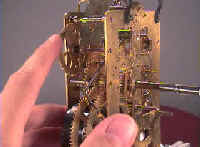Antique Clock Repair?Information - FAQWhy antique clock repair?Tick Tock Productions |
Clock repair questions and answers. |
|||
|
About Clock Repair Antique clock repair services today are in high demand. There are thousands of antique clocks waiting to be repaired. Almost anyone can learn with proper instruction . Many people repair clocks as a hobby, and there are others that have a part time or full time business of repairing clocks. People can have various problems with their antique clocks that can be solved by an experienced clock repair person. These repairs can be learned by the courses offered here at www.ticktockpro.com. The
popularity of antique clocks has grown tremendously over the last couple
of decades. There are many
reasons for this change. Some think
it is due to an aging population that has an appreciation for nostalgia,
history, art, culture and a fascination for the past.
People appreciate the design, craftsmanship and engineering that
went into clock making. There are 3 primary types of clocks: Mantel clocks - Mantel clocks can be further divided in other categories such as: Tambour, Steeple, Ogee, Statuary, Kitchen, Carriage, Pillar and Scroll, Crystal regulator, Swinger and many others. These are also referred to as shelf clocks. Wall clocks - These clocks include and clock that hangs on the wall: Regulators, Banjo, School, Cartel, Cuckoo and other Black Forest clocks. Some Ogee clocks, Calendar and Kitchen clocks were also wall clocks. Tall
case or Grandfather clocks. This is any clock that stands on the
floor. These also include smaller versions called Grandmother and
Granddaughter clocks. Some regulator clocks that sit on the floor
are called floor regulators. Some of the most common antique clock problems and questions about clock problems can be:
Antique clocks have either 1, 2 or 3 winding holes. One hole would indicate a time only clock. Two winding hole is a time and strike clock. Three winding holes is a chime clock. Antique clocks are generally powered by either mainsprings or weights. Mainsprings allow the clock to be smaller and fit on a shelf or mantel. Weights require length to unwind like in a grandfather or tall case clock. The strike or chime can be on a bell, rod, coiled rod. Some clocks strike on the hour, hour and half hour and quarter striking clocks. Many clocks are "time only". They neither strike or chime. They only tell time. Clock cases are made of wood, marble, alabaster or iron. The wood is either solid, veneer, painted, finished or applied with adamantine. The French were known for their marble clocks. Some clock cases were also made from alabaster. Many people think that the French clocks were not marble, but made of slate. They were not made of slate. They are Belgium marble. Slate has many different characteristics than marble. They can both be black, but that is the only similarity. Clocks that were made of adamantine were generally American made clocks imitating the French marble or alabaster clocks. Adamantine was an early celluloid product. American made clocks that were wood painted black or made of iron painted black were created to imitate the French style black marble clocks. To learn about clock repair can be enjoyable, satisfying and profitable. You can learn from home with video home study courses on DVD. Many are making a part time or full time occupation repairing clocks. You can work from home or open your own repair and restoration shop. The information in these courses will teach you more efficient solutions to many clock repair problems.
Don't want DVDs? Want instant online access? Click below for the NEW
|
FAQ Clock strikes at the wrong time? Clock strikes and chimes at the wrong time? Clock will not chime or strike? Clock runs only a few minutes? How to put the clock in beat? Where to learn about clock repair? Why a clock repair DVD or video?
Click here to email any questions.
|
|||
